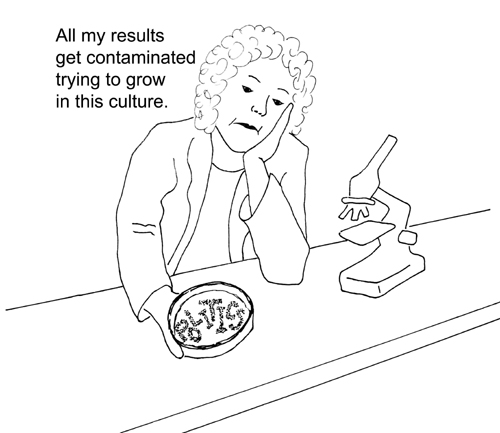
Source of cartoon: Environment and Animals
A couple of news stories caught my attention today. I think there is a relationship between them, and they may serve to illustrate a point:
We need to educate the public if we want to do the best science!
"Religious 'shun nanotechnology'"
BBC News, 8 December 2008
According to an article published in Nature Nanotechnology, "researchers compared attitudes to nanotechnology in 12 European countries and the US. They then rated each country on a scale of what they called "religosity" - a measure of how religious each country was. They found that countries where religious belief was strong, such as Ireland and Italy, tended to be the least accepting of nanotechnology, whereas those where religion was less significant such as Belgium or the Netherlands were more accepting of the technology."
"Terrorizing Medical Research"
P. Michael Conn and James V. Parker, The Washington Post, December 8, 2008
Last month terrorists, "reportedly from an organization known as the Animal Liberation Front (ALF)," used an incendiary device to destroy two cars. "The intended target of this violence, a researcher at the University of California at Los Angeles, was a scientist who uses animals in his work."Comment: Religious conservatives want to slow down nanotechnology development in Europe. Animal rights activists are willing to use violence to prevent animal experimentation in the United States, even though their actions will slow down biomedical research efforts that may yield important health benefits.
In our book, "The Animal Research War," we profiled researchers who have abandoned successful careers because they are unwilling to put their families, in many cases including young children, in danger.
Eco-terrorists also burned down the laboratory of one of my former colleagues objecting to her agricultural research using the techniques of biotechnology. They may have slowed down her efforts to improve food crops needed to reduce hunger in Africa.
Don't get me wrong. I spend a couple of decades working hard to assure that there were appropriate safeguards to animal welfare incorporated not only into the research being supported in my office, but also more generally in developing nations. I spent comparable time trying to make sure that risks to researchers, research subjects, the environment and the public posed by research were contained, and that research was not funded where the risk exceeded the estimated likely benefits from the research.
I feel strongly that the scientific community should work to assure the ethical conduct of research in these and other respects, that civil society has an important role to play in advocating the ethical conduct of research, and that the media and the public have the right of freedom of expression of their concerns in these and other areas of public policy.
On the other hand, it is far better that opinion be informed. Too often, in my experience, science policy makers have been too conservative in their support of important research due to uninformed public fears of adverse consequences of the research. And of course the willingness to use terrorist tactics to impose uninformed prejudice on the public is morally wrong!
It seems to me that the examples given above illustrate deep cultural roots of dysfunctional behavior. We know that the opposition to the teaching of evolution or to stem cell research in the United States is rooted in a relatively small fraction of the population characterized as "the religious right". However, more main stream religious groups oppose these and other scientific activities in other countries.
I suspect too that the animal rights terrorists and the eco-terrorists reflect deeply rooted aspects of American culture.
The Enlightenment was the start of a centuries long process of cultural change leading to more rational uses of knowledge in public policy, but one hopes that process has not stalled when partially completed. I see educational policy and science policy as the keys to continuation in this process. JAD
1 comment:
Hello Paul!
Your dog looks like a great companion. I am glad you saved his life.
Post a Comment